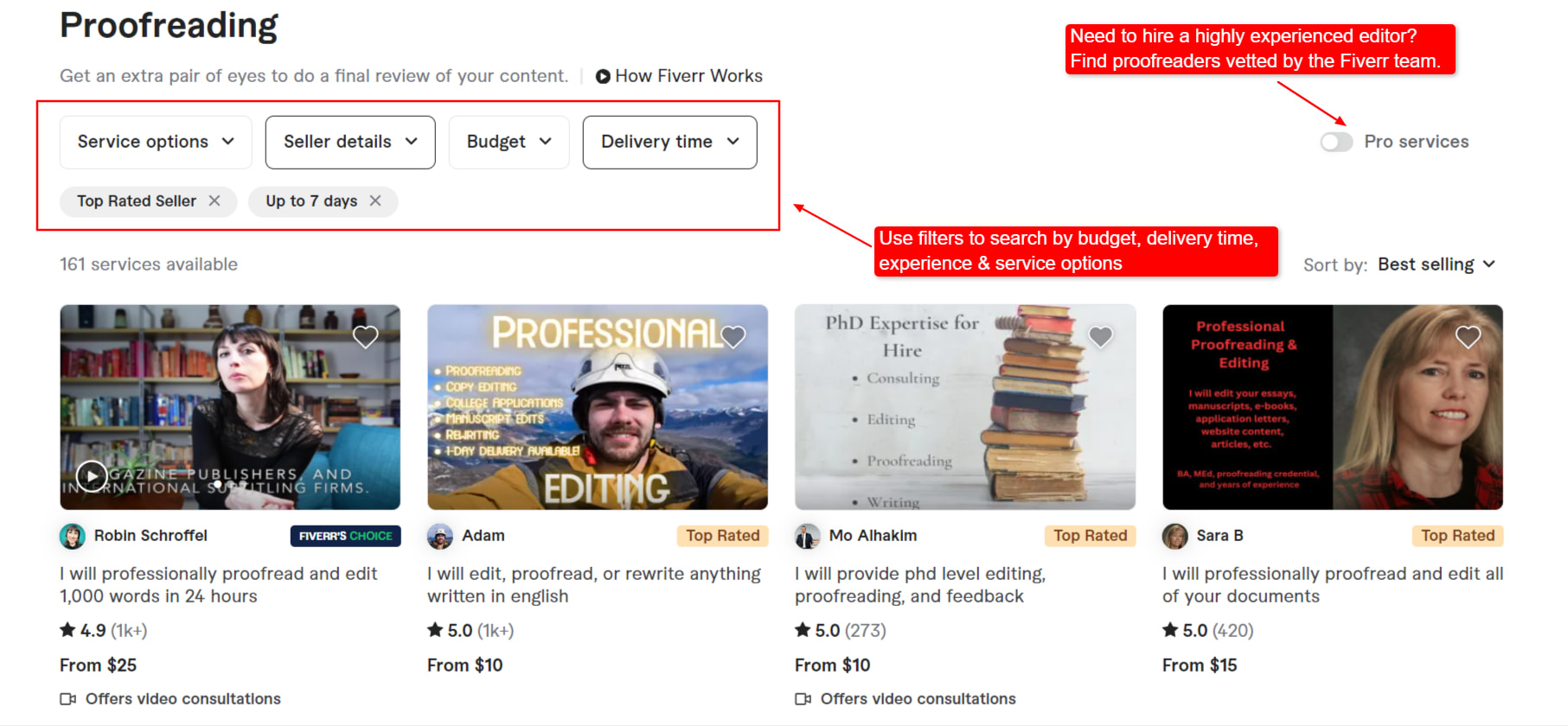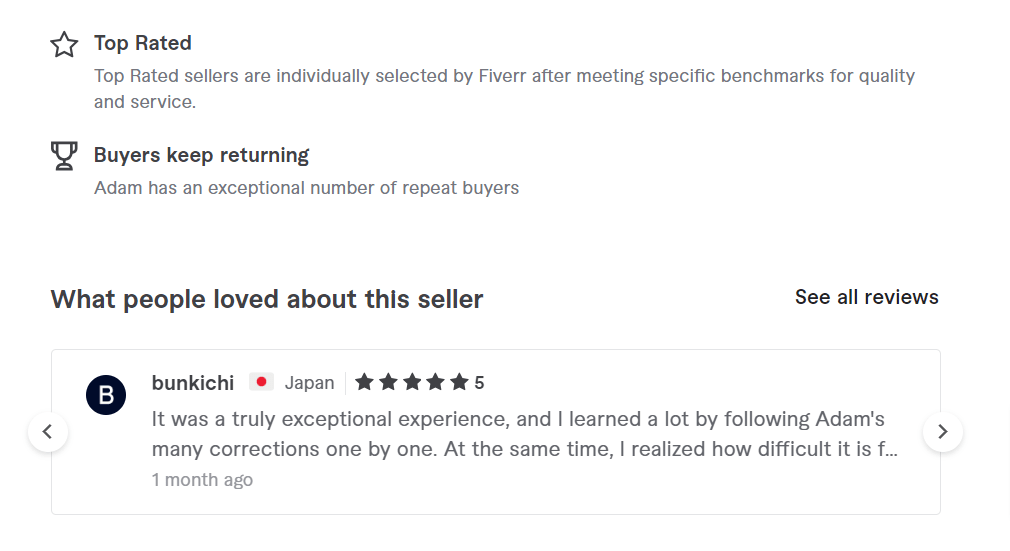How Much Do Proofreading Services Cost in 2024?
If you’re planning on hiring proofreading services in 2024, you’re in the right place. Learn more about the average costs and factors that impact pricing in this informative guide.
 March 5, 2024
March 5, 2024 7 minute reading
7 minute reading
You've done it. You've written your book or manuscript, had it copyedited, and you're close to publishing it.
But there's one thing you need to sort out before taking that step— proofreading the manuscript.
This step is critical for anyone who wants to create a polished draft that reflects their expertise and hard work. It's easy for your readers to get distracted by minor typos, and that's precisely what proofreading helps you avoid.
Typically, proofreaders charge between $0.03 to $0.1 per word to edit your document. But that varies depending on their experience, bandwidth, and document length.
We'll break down the costs of online proofreading services and tips on hiring the right proofreader for your work.
Hire a freelance proofreader on Fiverr
How much do freelance proofreaders charge?
We've created a proofreading price list based on data from top industry associations such as:
These rates have been adjusted for inflation based on when the survey data was published.
Below, we've categorized that data based on the common pricing models that proofreaders use.
Proofreading per word
Per word pricing is one of the most straightforward and widely used pricing models. The editor will charge you a specific rate based on how many words in your manuscript.
This model is effective for the editor and client as it's dependent only on the number of words—which works as proofreading is the last pass of editing.
Also, it's easier to budget and calculate the upfront cost of editing. However, the per-word pricing might be too high if the work is too complex.
Per-word rates range between $0.03 and $0.1 for document proofreading.
Here's how much you can expect to pay for different genres:
Fiction: $0.03 to 0.09 per word
Non-fiction: $0.03 to 0.09 per word
Business: $0.05 to $0.1 per word
STEM: $0.05 to 0.09 per word
Media: $0.03 to 0.09 per word
Proofreading per hour
Alternatively, less experienced proofreaders might charge you by the hour. They base the pricing on the time they spend reviewing your document.
The difference is that they can accommodate different levels of complexity and even types of manuscripts. This model might be the best option for a particularly technical manuscript.
The only downside is that there's no cap on the number of hours, and the costs can add up.
Hourly rates between $35 to $54 per hour for proofreading.
Here's how much you can expect to pay per hour for different genres:
Fiction: $35 to $41 per hour
Non-fiction: $43 to $47 per hour
Business: $49 to $54 per hour
STEM: $49 to $54 per hour
Media: $35 to $41 per hour
Proofreading per page
Editors charge you based on the number of pages in the document—usually with a set rate for each page. A typical page consists of 250 to 300 words.
It's simple to estimate the cost for physical documents that adhere to standard A4 or Letter formatting. For example, academic documents like books, research papers, or essays. But it's harder for documents that veer away from standard formatting.
It’ll cost you $2.70 to $10.80 per page to proofread your document.
Here's how much you can expect to pay per page for different genres:
Fiction: $2.70 to $3.20 per page
Non-fiction: $5.30 to $5.80 per page
Business: $6.10 to $6.80 per page
STEM: $9.80 to $10.80 per hour
Media: $2.70 to $5.80 per page
Proofreading per project
Most proofreaders don't charge by the project unless they include the proofreading cost within a copy or developmental editing package.
If you’re paying for a more extensive edit, this approach will help you with budgeting. Also, it encourages the proofreader to be as efficient as possible.
But make sure you have a clear scope of work drawn up before working with the editor.
The final rate is dependent on the length and complexity of your manuscript. Below, we've assumed it for a 1000-word document (or up to four pages).
It’ll cost you $11 to $25 to get a 1000-word document proofread.
Here's how much you can expect to pay per project for different genres:
Fiction: $11 to $15 per project
Non-fiction: $21 to $25 per project
Business: $25 to $28 per project
STEM: $40 to $45 per project
Media: $11 to $25 per project
Which factors impact proofreading rates?
Pricing seems simple, but there's a reason there’s a wide range of pricing across the board.
Let's look at what goes into setting proofreading services price.
1. Document length
Since the per-word pricing model is the most common way to charge for such services, your document's length matters. It depends on the final word count.
The longer your document, the higher the cost.
If you have a particularly lengthy document, it's best to go with a per-hour or flat-rate project to reduce costs.
2. Editor’s qualifications
Editors tend to have a Bachelor's degree in Literature, Communications, or English. Sometimes, you’ll find editors with Master's or Doctoral degrees who offer such services.
If your editor offers dissertation or essay proofreading services, especially in technical subject matter like STEM, they’ll charge a higher rate. Academic editing requires knowledge of the subject matter and citation styles like APA, MLA, etc.
Besides, if they’re part of a professional organization, they'll likely charge more than the base rate given in the guidelines.
Find qualified editors who offer dissertation proofreading services.
3. Editor’s experience
The number of years of experience influences how much a proofreader charges. They might proofread quickly, but that also comes at a price.
However, you'll be assured of better editorial standards and error-free documents.
If you're low on budget and aren't working with technical documents, choosing an editor with one to three years of experience is best.
4. Niche of the book
There are several industries or niches proofreaders operate in. Some include:
Business
Sales
STEM
Fantasy fiction
Romance
Scientific fiction (sci-fi)
Teen fiction
Non-fiction novels
The costs increase depending on the level of expertise required. For example, you can expect to pay higher rates for STEM documents or sci-fi novels. But for romance and teen fiction, expect to pay in the lower range.
5. Type of writing
Are you getting a novel edited or a college essay? It requires vastly different editing skills, and the rates vary widely.
For example, asking an experienced editor to review your college essay will cost you more than an editor reviewing a fantasy novel.
6. Turnaround times
Even if it's a last-pass edit, proofreaders still need time to go through the document and spot issues such as:
Grammar
Punctuation
Typos
Syntax
Formatting
Readability
Style
Tone
Factual inaccuracies
If you get a 1000-word document, you can get it back in 24 hours on marketplaces like Fiverr. But for a 20,000-word document, you'll have to wait around seven days.
Plus, if you want to jump an editor's queue, you may have to pay a 10% to 30% rush fee to prioritize your project.
7. Editor’s pace
Individual proofreaders work at different speeds, and their pace can influence how they set their editing prices.
For example, an inexperienced editor may take longer to proofread the document. In this case, go for a per-word or flat rate pricing to avoid eating up your budget.
An experienced editor would have a faster pace and higher prices, irrespective of the pricing model.
However, for more complex writing like essays, dissertations, or elaborate novels, expect a slower pace of work in general.
8. Author’s manuscript sample
If your manuscript still has many errors that should've been handled in the developmental editing or copy editing phase, it could increase the final proofreading service cost.
For example, if you’re not a native English speaker and handled the initial edits on your own, the document could need extensive editing.
Some proofreaders would either adjust the rate to include these editing services (if they offer it) or ask you to work with an editor first.
5 tips for hiring a freelance proofreader with ease
Here are 5 things you need to do before hiring your first proofreader.
1. Do your research first
Use freelance marketplaces like Fiverr to access a broad range of service providers. We have dedicated categories for proofreading and professional editing, and you can use search filters to find the best freelance proofreaders.

Use search filters to find freelance proofreaders
For example, if you need someone to proofread an essay on a $50 budget, toggle the search filters and enter your desired budget.
Use that information to review the profiles of proofreaders that fit your criteria. Take advantage of the chat system to discuss your needs and learn more about their experience.
Here are a few things you should ask for:
Years of experience
Niche experience
Certifications (if any)
Portfolio
Rates
Delivery period
2. Ask proofreaders for samples
With samples, it's easier to gauge how the proofreader works. This issue is especially true for individuals or businesses who need complex work edited. For example, it could include business documents like annual reports.
When possible, request before-and-after samples from the editor's portfolio to assess fit. Review these documents to observe changes in clarity and flow and see if they can spot common grammatical and style issues.
3. Clarify expectations before working with them
Set expectations before you start working with a proofreader. Discuss the project's goals, the level of editing you expect, and specific concerns you may have.
For example, if you expect extensive editing like a copy edit, the editor may tell you beforehand whether it's covered in the service.
Also, ask them how many rounds of revisions the package includes. This prevents you from wasting money on unnecessary costs after delivery.
4. Request a paid sample edit to assess the fit
Get a paid trial, especially if your document is for an important purpose like a college essay or submission at work.
It allows you to evaluate if the proofreader fits your needs and lets you address concerns before you move on to the larger project.
A 500-word document should be enough to assess their service quality, so add this to your overall budget.
5. Look at past reviews or testimonials
Unless a proofreader is a beginner, reviewing their past testimonials or reviews is best. These reviews speak to the credibility, reliability and quality of their work.
For example, on Fiverr, you can view the following to make an informed decision:
Number of reviews
Overall rating (out of 5 stars)
Seller badge
Returning buyers

An example review from a freelance proofreader’s profile on Fiverr
The better the reviews, the better the quality and reliability of the freelance proofreader.
Hire the best proofreaders on Fiverr
Professional proofreading services act as the last line of defense for your document—which means you need to work with someone meticulous and quality-driven.
Whether for one-off or ongoing work, consider working with a freelance proofreader who understands your industry and the nuances of each type of document.
It bodes well for three reasons:
You get access to someone who has the credentials and expertise to help you.
You get customized and high quality services based on your needs and budget.
You get to work with someone flexible and available based on your needs.
Ready to find your next proofreading partner? Sign up for Fiverr and get your first document edited today.



